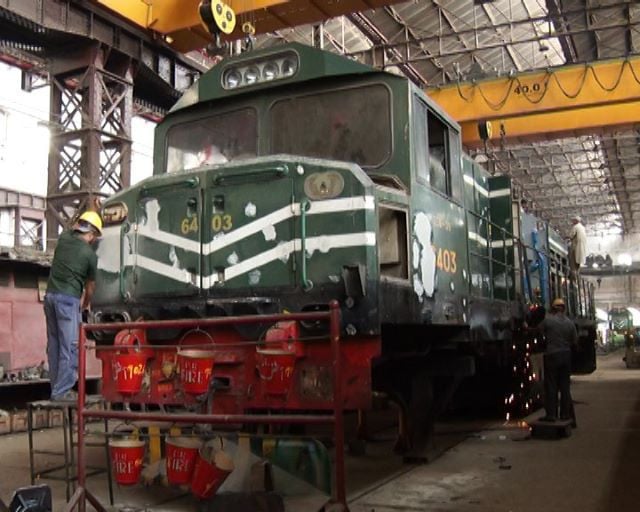
The tragic death of 35 people and other injuries of 100 others in the Hazara Express accident has once against raised new questions about train safety in the country after several similar recent incidents.
Many nations not only generate billions of dollars annually through their well-developed railway systems but also leverage them to promote tourism. In contrast, Pakistan's railway system is witnessing a decline rather than progress.
Neighbouring India has made significant advancements and is on the verge of introducing bullet trains. Even war-torn Afghanistan has managed to make rapid progress in developing its own railway infrastructure.
The recurring problem in the country is with thousands of people losing their lives or sustaining injuries in numerous train accidents over the years. Pakistan witnessed its deadliest train accident on January 4, 1990, and the first major accident occurred near Jhampir in 1953, claiming the lives of 200 individuals.
Earlier this year, on April 27, a horrifying fire in a carriage of the Karachi Express travelling from Karachi to Lahore claimed the lives of seven people, including a woman. These incidents point to the pressing need for improvements in train safety and infrastructure across the nation.
In light of these incidents, Pakistani Railway authorities have emphasised projects like the ML-1 and the Pakistan, Afghanistan, Uzbekistan Railway initiative, aiming to revitalise the railway system and steer it towards prosperity.
One of the major challenges faced by Pakistan Railways is its expenditure on salaries and pensions, which has exceeded the total revenue generated by the railways.
The salaries of pensioners are higher compared to the current employees, exacerbating the financial challenges. A significant portion of the railways' revenue is allocated towards these expenses and the purchase of diesel. In the financial year 2022-23, an estimated Rs47.36 billion was spent on these items.
With over 61,000 employees, Pakistan Railways faces a substantial financial burden. In the same financial year, their total salaries exceeded Rs35 billion, while the total number of active pensioners exceeded 111,000, with pensions totalling over Rs40.50 billion.
It is evident that urgent action is required to address the financial losses and ensure a safer and more efficient railway system. Despite achieving a record revenue of Rs62 billion during the financial year 2022-23, the railways fell short of its target by Rs7.42 billion.
The railways have set a target of Rs80 billion for 2023-24, with a revenue target higher than the previous year by over Rs10 billion.
Financial loss
However, one of the major challenges faced by PR is the escalating expenditures on salaries and pensions, which have surpassed the total revenue generated.
The salaries of pensioners exceed those of current employees, exacerbating the financial challenges. A significant portion of the railways' revenue is allocated towards these expenses and the purchase of diesel.
In the financial year 2022-23 alone, an estimated Rs47.36 billion was spent on these items.
With over 61,000 employees, Pakistan Railways faces a significant financial burden. In the same financial year, their total salaries exceeded Rs35 billion, while the number of active pensioners exceeded 111,000, with pensions totalling over Rs40.50 billion.
Despite achieving a record revenue of Rs62 billion during the financial year 2022-23, the railways fell short of its target by Rs7.42 billion. For the upcoming financial year 2023-24, the railways have set a target of Rs80 billion, aiming for a higher revenue than the previous year by over Rs10 billion.
Human loss
The loss of human lives in train accidents is a grave concern. Between 2018 and March 2021, numerous train accidents resulted in the deaths of 230 people and serious injuries to 285 individuals.
These incidents involved passengers, passers-by, and railway employees. In January 2021, the annual accident report by Pakistan Railways revealed that 137 accidents involving various vehicles occurred in 2020, resulting in 56 deaths and 58 injuries.
Furthermore, numerous incidents of fire have been reported in different railway vehicles. These accidents have had devastating consequences, such as the derailment of the Jafar Express in Sibi in 2022, injuring six people, and a major accident near Pannu Aqil that claimed the lives of 307 individuals.
Earlier reports by the Ministry of Railways highlighted that from May 2013 to March 2017, the country witnessed 304 train accidents, including 20 highly dangerous incidents.
Dilapidated track system
Meanwhile, in a concerning revelation, sources said that no significant improvements have been made to Pakistan's railway track system since the country's formation.
The nation continues to rely on railway infrastructure that was constructed by the British over 150 years ago, highlighting the urgent need for modernization and maintenance.
Many railway bridges in Pakistan have expired, with the majority of them being over 100 years old. However, the government has shown a lack of attention towards overhauling these crumbling structures. Furthermore, thousands of accident-prone
The authorities of Pakistan Railways have made the ML-1 project their focus of attention to take the railways out of decline and towards prosperity. Chief Executive Officer Railways Shahid Aziz says that after a four-year standoff, progress has been made as a result of Prime Minister Shahbaz Sharif's visit to China in November 2022.
ML-1 project
The ML-1 project aims to establish a double line spanning 1733 km from Peshawar to Karachi, with train speeds ranging between 140 to 160 km.
This ambitious endeavour will not only increase the line capacity between the two cities to accommodate 100 trains up and down, but it will also contribute to reducing the cost of the project from $10 billion to $6.6 billion through government efforts.
Furthermore, it is expected to elevate the market freight share of the railways from four per cent to twenty per cent, providing employment opportunities for twenty thousand technical experts and boosting Pakistan's labour ratio to ninety per cent.
Federal Minister of Railways Khawaja Saad Rafiq, emphasized the significance of the ML-1 project in conjunction with the Pakistan, Afghanistan, and Uzbekistan railway initiative, as it has the potential to generate prosperity and revolutionize the entire region.
On July 18th, protocols and road maps were signed to connect Pakistan with Central Asia, Russia, and the Baltic states. The comprehensive plan includes the construction of a 191 km track from Kharlachi and a 674 km track from Kharlachi to Mazar Sharif, with an existing track already in place from Mazar-e-Sharif to Tirmaz.
Highlighting the dire circumstances facing the railways, the railways minister noted that the organisation has encountered significant financial difficulties, exacerbated by the requirement to allocate funds for pensioners' salaries.
Former CEO of Pakistan Railways Arshad Salam Khattak shed light on the harsh impact of last year's catastrophic floods, which caused irreparable damage to the railway system.
Approximately 400 km of railway tracks were submerged, resulting in severe bridge impairments and the isolation of many regions, including Rohri, Sukkur, and Quetta. The railway had to bear a loss of over 500 billion rupees as a result.




1730806656-0/BeFunky-collage-(23)1730806656-0-165x106.webp)



1730806490-0/New-Project-(2)1730806490-0-270x192.webp)
1730802981-0/Untitled-design-(53)1730802981-0-270x192.webp)

1730799445-0/Untitled-design-(52)1730799445-0-270x192.webp)




1730706072-0/Copy-of-Untitled-(2)1730706072-0-270x192.webp)
COMMENTS
Comments are moderated and generally will be posted if they are on-topic and not abusive.
For more information, please see our Comments FAQ